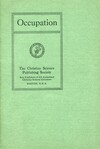

Are you sure?
This bookmark will be removed from all folders and any saved notes will be permanently removed.
Signs of the Times
["Expectation"—The Christian Science Monitor, Boston, U.S.A., Jan. 4, 1921]
In one of his lectures on Shakespeare delivered in London, a little over a century ago, Coleridge, under a sectional heading, "Expectation in preference to surprise," has this to say: "It is like the true reading of the passage: 'God said, Let there be light: and there was light;' not there waslight. As the feeling with which we startle at a shooting star, compared with that of watching the sunrise at the preestablished moment, such and so low is surprise compared with expectation."
There is a great truth in this statement. Whether Coleridge's reading of the particular passage in Genesis to which he alludes commends itself or not, the fact remains that expectation must ever be "preferred" to surprise for the reason that expectation is the normal attitude of man, surprise having no place in real consciousness. One dictionary definition of expectation is "awaiting with confident anticipation." This attitude of awaiting with confident anticipation underlay all Jesus' teaching and was characteristic of all his works. The Christian, as Jesus conceived him, took no thought for what he should eat or what he should drink or what he should put on. Why? Because he recognized that the Father knew he had need of these things. The Christian, as Jesus revealed him, never resorted to drugs for the healing of the sick or to any material means for overcoming apparent obstacles, or for defending himself against evil happenings. His appeal was ever to Spirit, and his attitude was one of "confedent anticipation" that this appeal would be and must necessarily be answered. "Father," said Jesus at the tomb of Lazarus, "I thank thee that thou hast heard me. And I knew that thou hearest me always," and to his disciples on another occasion, "Therefore I say unto you, What things soever ye desire, when ye pray, believe that ye receive them, and ye shall have them."
Enjoy 1 free Sentinel article or audio program each month, including content from 1898 to today.
JSH Collections
This article is included in:
1921 - PAMPHLET
Occupation
JSH-Online has hundreds of pamphlets, anthologies, and special editions for you to discover.
March 5, 1921 issue
View Issue-
The Banqueting House
PERCY PHILLIP VYLE
-
The Perfection of Creation
OLIVER BOWLES
-
"Know thyself"
HELEN M. DAGGETT
-
Authority
ALICE M. BOTTUM
-
Knowing
MOLLIE A. HOWE
-
"The ditch of nonsense"
Frederick Dixon
-
We Are All Beginners
Gustavus S. Paine
-
I am unspeakably grateful for the many blessings received...
Lancelot George Whitehead
-
After suffering for several years from neuritis, for which...
Pearl Geneva Snyder
-
I wish to try to express some of the gratitude I feel for...
Kate Hawthorne
-
It gives me great pleasure to be able to express my...
Erle Whitney with contributions from Emma M. Lambert
-
Thinking over a recent Lesson-Sermon, one sentence...
Ella W. Walstrom
-
It is with much gratitude that I give my testimony of the...
Follette Brotherton
-
In the fall of 1914 I was instantaneously healed of gallstones...
Ernest L. Bailey
-
In the summer of 1902 Christian Science healed me, in...
Regina C. Yount
-
Signs of the Times
with contributions from James L. Gordon, Oskar Seitz, Oliver M. Fisher, Norman Maclean
-
Notices
with contributions from Charles E. Jarvis



